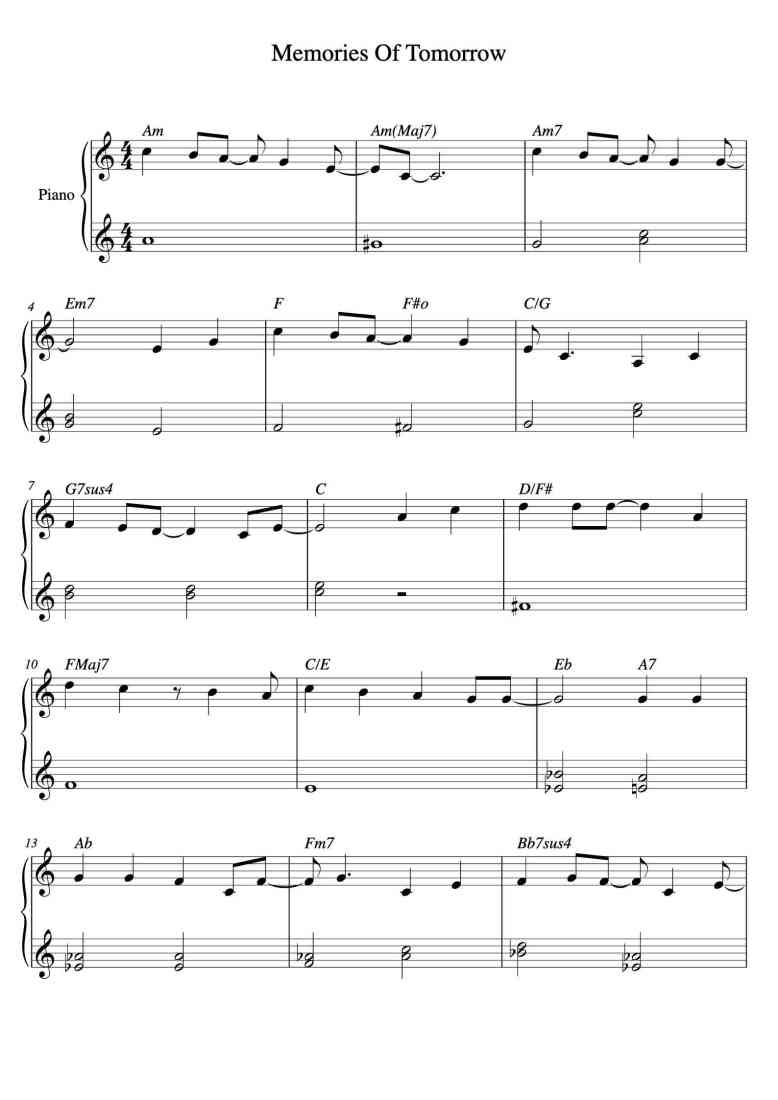00:00/00:00
Tomorrow - John Kander
Partituras de piano gratuitas
Os recursos nesta plataforma são enviados pelos usuários. Se você acredita que seus direitos de propriedade intelectual foram violados, entre em contato conosco através do copyright@openscorevault.com.
About this product
Tomorrow, by John Kander
Análise de dificuldade
Several measures present technical challenges:
-
Measures 5-7: The rapid movement between notes, particularly the repeated C5 in conjunction with E5 and D5, can lead to difficulty in maintaining clarity and timing.
-
Measures 19-21: The combination of sixteenth notes and quick successive chords requires finger dexterity and control.
Suggested Solutions:
-
To overcome the rapid changes in measures 5-7, it is beneficial to practice these sections slowly, using a metronome to maintain steady timing. Breaking the passages into smaller phrases and gradually increasing speed will aid in building muscle memory.
-
For measures 19-21, isolating the left-hand accompaniment beats and practicing them separately can help solidify the rhythm. Additionally, using a staccato touch on the chords may facilitate cleaner transitions between notes.
Dicas de prática
Addressing Performance Challenges:
To effectively master the complexities of the "Tomorrow" score, specific practice techniques can be implemented:
-
Rhythmic Independence: Isolate the right and left hands during practice sessions. Playing the left-hand patterns alone will help solidify the harmonic foundation, allowing the player to focus on the melodic execution in the right hand.
-
Use of Gradual Acceleration: Start practicing challenging passages at a slower tempo, aiming for precision before increasing the speed. This method is especially useful for measures 5-7 and 19-21, as it will build confidence and clarity.
-
Phrase Recognition: Identifying and practicing each melodic phrase within the piece can help in making the performance more emotional and expressive. Focus on measures 15 and 18, which have repeated phrases that can serve as highlights in the performance.
Effective Utilization of the Score:
As this piece is perfect for both developing performers and seasoned musicians, it encourages emotional interpretation through its lyrical phrasing and straightforward harmonic structure. Players should take the time to explore their expressions and dynamics while adhering to the established rhythmic patterns.
Apreciação musical
Detailed Analysis of the Piano Sheet Music for "Tomorrow"
Composer: John Kander
Key: C Major
Time Signature: 4/4
Tempo: 120 BPM
Instrument: Piano
Number of Tracks: 1
Unique Features:
The arrangement of "Tomorrow" showcases a rich harmonic canvas, primarily based in C Major, which contributes to the optimistic and hopeful nature of the piece. The score consists of a clear division between melody and accompaniment, with the right hand primarily carrying the melody and the left hand providing harmonic support.
-
Melodic Structure: The main melody is characterized by flowing phrases, which often utilize stepwise motion and occasional leaps. The use of sustained notes, such as in measures where the composer uses the full notes (e.g., [C5-] in bars 6 and 14), allows for a lyrical expression of the vocal line's hopeful sentiment.
-
Harmonic Progression: The chord progression throughout the piece remains diatonic to C Major, alternating between tonic (I), subdominant (IV), and dominant (V) chords. For example, the shift in harmonies observed between measures 10 and 12 highlights a transition from G major (V) to C major (I), creating a satisfying resolution.
-
Rhythmic Patterns: The rhythmic structure is largely consistent, with most notes divided evenly across the beats, providing a feeling of steadiness. However, there are variations, such as the syncopation noted in measures 19-20, where the placement of notes creates a sense of forward motion.
Specific Highlights:
In measure 11, the overlapping of right-hand chords with the melody emphasizes the chord tones, while the left hand complements these notes with harmonies that create depth. Additionally, measures 15-18 feature repeated melodic lines that enhance memorability and emotional impact, characteristic of musical theatre.
Detalhes rápidos
Tomorrow
- ArtistJohn Kander
- Number of imitations:47
- GenreJohn Kander
- KeyC
- Tempo120
- Pages2
- NotationJohn Kander
- ComposeJohn Kander
- IntroductionTomorrow' - John Kander, This music is undefined, arr. by John Kander, Suitable for all students to learn
Recomendações




